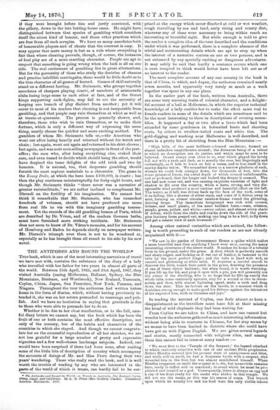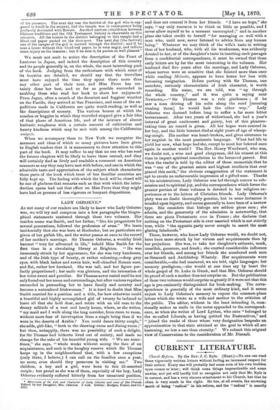THE ANTIPODES AND ROUND THE WORLD.* Tras book, which is
one of the most interesting narratives of travel we have met with, contains the substance of the diary of a lady who travelled with her father for two years in almost all parts of the world. Between 15th April, 1865, and 21st April, 1867, they visited Australia (seeing Melbourne, Ballarat, Sydney, the Blue Mountains, Brisbane, and Westbrook), New Zealand, Tasmania, Ceylon, China, Japan, San Francisco, New York, Panama, and Niagara. Throughout the tour the authoress had written letters home in the form of diaries, which, without having previously in- tended it, she was on her return persuaded to rearrange and pub- Rah. And we have no hesitation in saying that gratitude is due to those who were able to persuade her to do so.
Whether it be due to her clear recollection, or to the full, care- ful diary letters we cannot say, but the book which has been the fruit of one or both contains the most effective description, not only of the scenery, but of the habits and characters of the -countries in which she stayed. And though we cannot congratu- late her on the successful reproduction of all her sketches, we are aot less grateful for a large number of pretty and expressive vignettes and a few well-chosen landscape subjects. Indeed, one would have been surprised if there had been none, after reading some of the little bits of description of country which accompany the accounts of doings of Mr. and Miss Frere during their two years' wandering. Those who really read the book, and it is well worth the trouble of reading by any who are interested in the parts of the world of which it treats, can hardly fail to be stir- * The Antiposks and Rows'! The World ; or, Trareta in Australia, New Zealand, Ceylon, China, Japan, and California. By L. B. Freon (Mrs. Godfrey Clarke). Illustrated. Londou: Maicharda. 1870.
prised at the energy which never flinched at cold or wet weather, rough travelling by sea and land, early rising and scanty diet, wherever any of these were necessary to bring within reach an interesting or beautiful sight. But while enough is told to give the reader a complete idea of the tour described and the conditions under which it was performed, there is a complete absence of the trivial and uninteresting details which are apt to crop up when the interest of a narrative centres on one or two persons, and is not enhanced by any specially exciting or dangerous adventures. It may safely be said that hardly a sentence occurs which one is even tempted to think would better have been left out as of no interest to the reader.
The most complete account of any one country in the book is that of China, in which, and Japan, the authoress remained nearly seven mouths, and apparently very rarely as much as a week together was spent in any one place.
In the earlier part of the hook, written from Australia, there are some very amusing traits of colonial character, and a delight- ful account of a ball at Melbourne, in which the superior techuical knowledge of a lady enables her to make the effect more real to female readers in some of the details which are sometimes said to be the most interesting to them in descriptions of evening assem- blies. It happened a day or two after a levee which had been attended by some gentlemen in hobnailed boots and shooting coats, by others in swallow-tailed coats and white ties. The gold-digging and washing near Melbourne is well described, and there is a pretty bit of sketching from the Blue Mountains :—
"High hills, of the most brilliant-coloured sandstone, formed an almost unbroken amphitheatre around ; the distances being of a colour to which no description can do justice, and which must be seen to be believed. Grand scarps rose close to us, over which played the lovely fall, not with a rush and dash, as is usually the case, but lingeringly and caressingly, as if loth to leave so fair a seen., and to lose itself in the murky depths below. We scrambled down to a narrow platform of rock, whence we could look straight down, for thousands of feet, into the dense prima3val forest, the awful depth of which seemed unfathomable, and so profound, that the longer one looked the deeper it seemed. The sun had now come out, and was causing exquisite varieties of light and shadow to flit over the country, while a keen, strong, and very dis- agreeable wind produced a most curious and beautiful effect on the fall. The water, as it fell, was driven back up the face of the rock, some of it re-falling, like a shower of silver stars, and some of it driven away in mist, forming an almost circular rainbow-frame round the glittering, dancing drops. The immediate foreground was rich with mosses, lichens, and small plants, of the most brilliant hues,—rose, crimson, purple, green, yellow, and white,--every colour, and almost every shade of colour, while from the clefts and cracks down the side of the preci- pice feathery ferns peeped out, making one long to be a bird, to fly down and get a nearer view of such treasures I"
Among other natural curiosities which are noticed, the follow- ing is worth presenting to such of our readers as are not already acquainted with it
" Ws saw in the garden of Government House a spider which makes a more beautiful nest than anything I have ever seen, among tho many interesting structures of the insect world. It makes its home of a tubular form in the ground, under the grass. A door, which is perfectly smooth and sharp-edged, and looking as if out out of leather, is fastened to the tube by the most perfect hinge ; and the tube is lined with web, as smooth and glistening as white satin. It requires a careful search to discover the little, round, bare patch in the grass, denoting the presence of one of these clover builders ; but when found, it is worth watching. If you lift up the lid, and prop it open with a pin, you will presently see the owner of the dwelling, who is so large that ho fills up nearly the whole tube, come cautiously upstairs, atop for a second or two to recon- noitre, and then, with almost lightning speed, make a rush and drag down the door. This he fastens on the inside, in a manner which is doubtless.strong enough to make good his defence against tho intrusions of his expected foes, such as thrushes and jays."
In reading the account of Ceylon, one feels almost as keen a disappointment as the travellers must have felt at their missing the kraal of wild elephants they had been waiting for.
From Ceylon we are taken to China, and here one cannot but wonder bow the authoress gathered so much interesting information without being able to converse in Chinese, for her stay seems by no means to have been limited to districts where she could have have got on with Pigeon English. We are given several legends and stories, mostly connected with religious rites, and among them this cannot fail to interest many readers
We went first to the 'Temple of the Serpent ;' the legend attached to which curiously coincides with one of our ancient Bible prophecies. Before Bhudha entered into his present state of omnipotence and bliss, and while still on earth, he had a desperate battle with a serpent, who wounded him in the foot, but was almost annihilated himself. When Bhudha reappears on earth the serpent is to die, but meanwhile remains here, ready to inflict, evil on mankind; to avoid which he must be pro- pitiated and treated as a god. Consequently, there is always an egg and a cup of tea kept ready for tbe snake who abides in this temple. We did not see the snake, as this was his season of coma. The branch upon which he usually lies and his food were the only visible tokens
cf his presence. The next day was the festival of the god who is sup- posed to dwell in the serpent, and the temple was in consequence being profusely decorated with flowers. Another curious coincidence between Chinese traditions and the Old Testament history is observable on this occasion. All the houses in the district belonging to this temple had a blood-red paper pasted on the door-post. The next day (the festival) one of the images of the god is carried through the district ; and if he sees a house without this blood-red paper, ho is very angry, and inflicts some injury on the inmates ; but if he sees it, he passes on well pleased."
We must not omit to notice the description of the Feast of Lanterns in Japan, and indeed the description of this country and its people generally is, on the whole, the most interesting part of the book. Judging from the enthusiasm with which some of its beauties are detailed, we should say that the travellers must have enjoyed the time they spent there more than any other part of their tour, and Miss Frere has cer- tainly done her best, and as far as possible succeeded in enabling those who read her book to share her enjoyment. From Japan, after a month of the dreariest and foggiest weather on the Pacific, they arrived at San Francisco, and some of the ex- peditions made in California are quite worth reading, as well as the descriptions of scenery. The various houses at which the coaches or buggies in which they travelled stopped give a fair idea of that phase of American life, and of the mixture of almost barbaric roughness with a certain amount of cultivation and hearty kindness which may be met with among the Californian emigres.
When we accompany them to New York we recognize the manners and ideas of which so many pictures have been given to English readers that it is unnecessary to draw attention to this part of the book. It may suffice to say that no one who has read the former chapters will be likely to leave these unread, and they will certainly find as lively and readable a comment on American manners as any they may have met with before, and one in which the admirable taste and appreciation of the subject which characterize those parts of the book which treat of less familiar countries are fully kept up. The feeling with which the book will be closed will be one of gladness that remarks such as that with which the intro- duction opens had not that effect on Miss Frere that they might have had on persons of less vigorous or buoyant dispositions.































 Previous page
Previous page